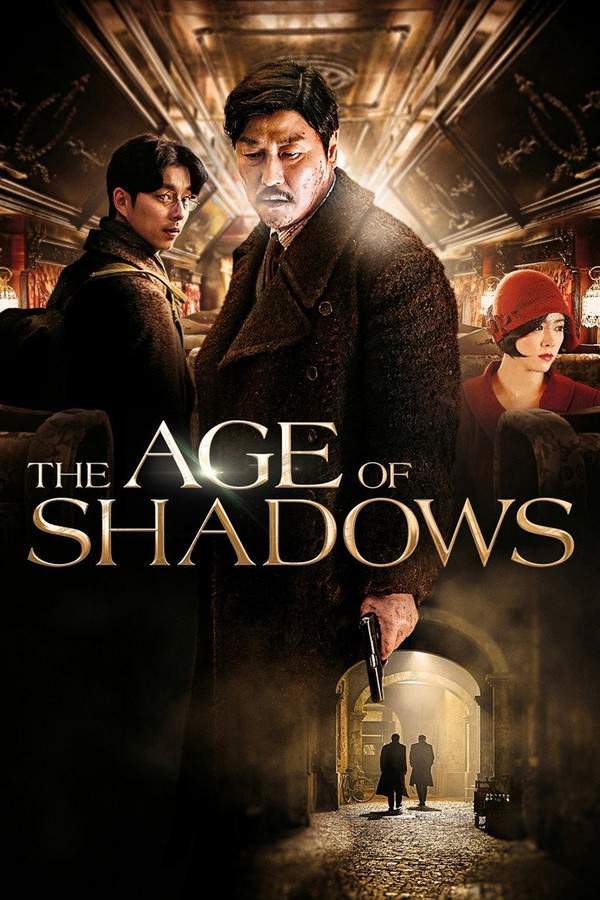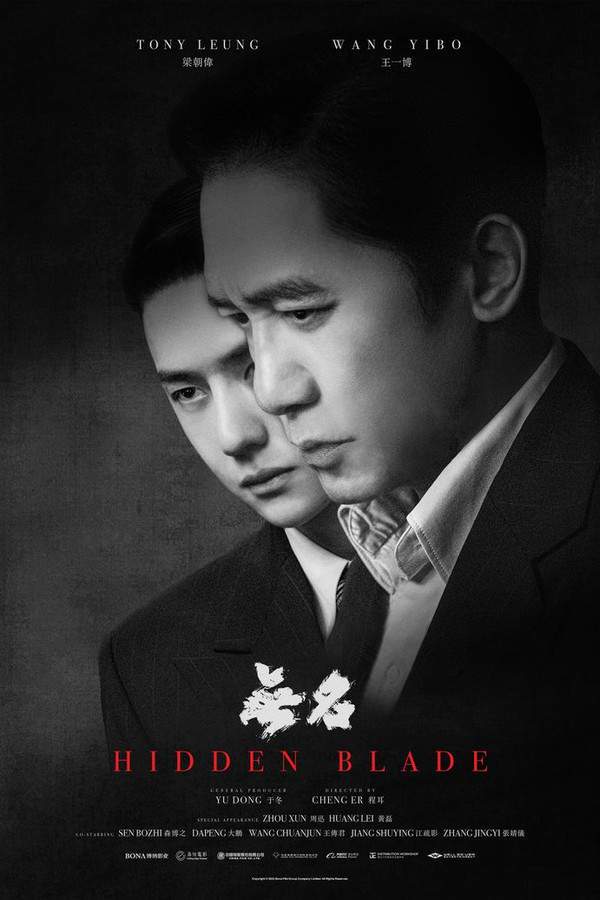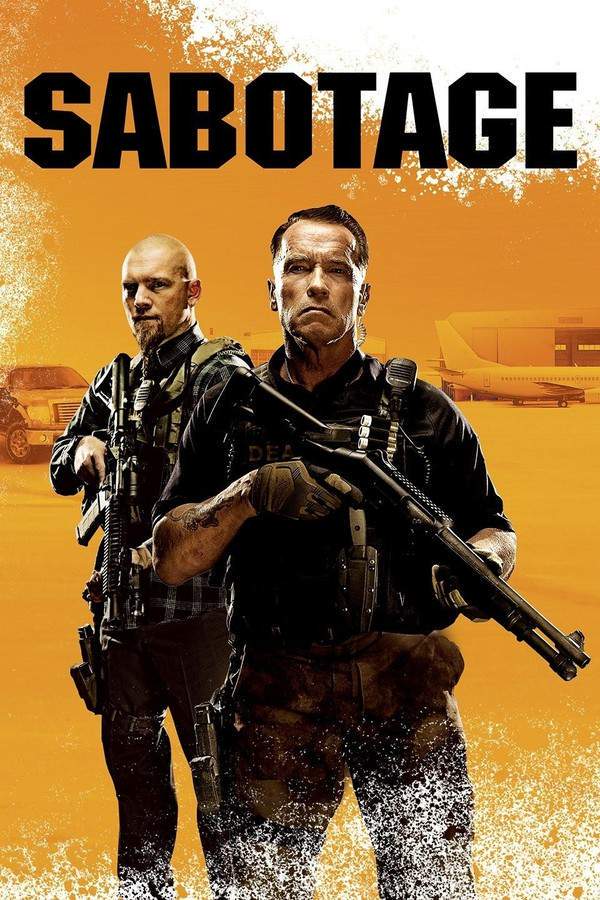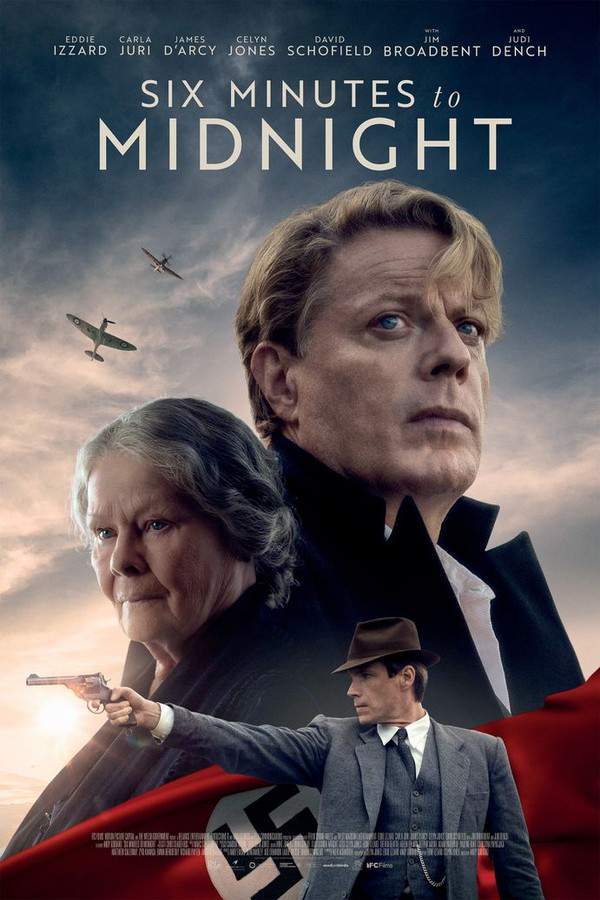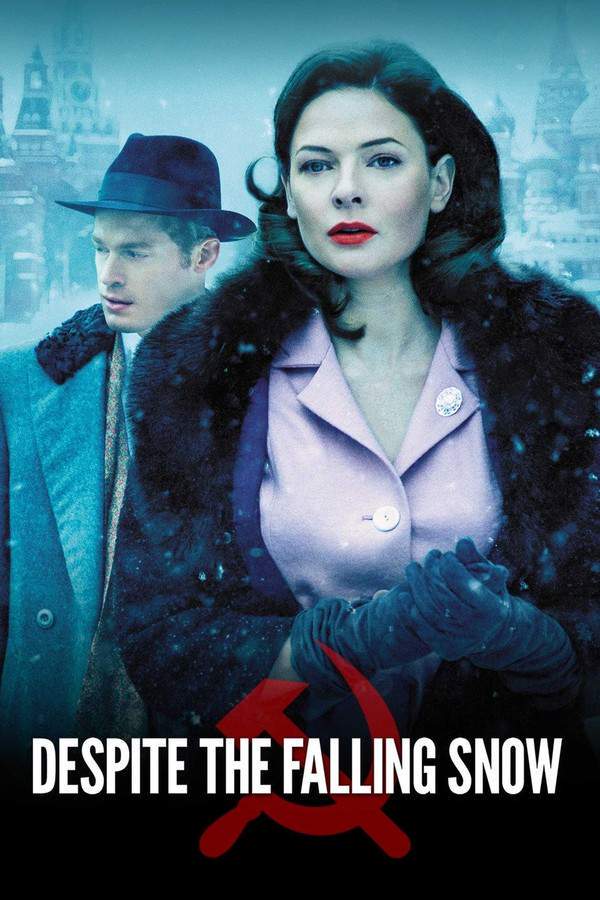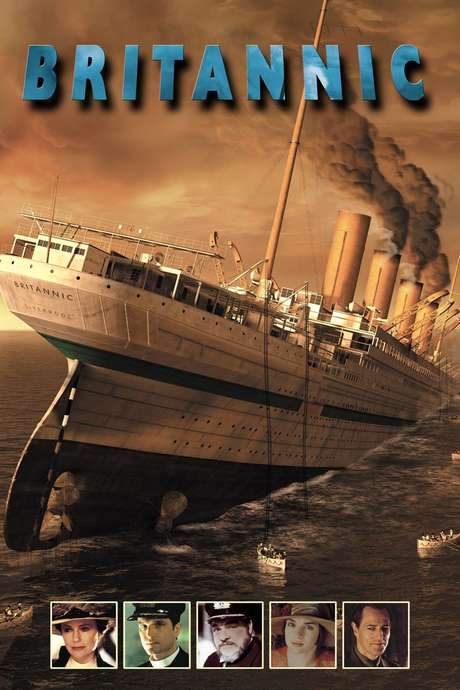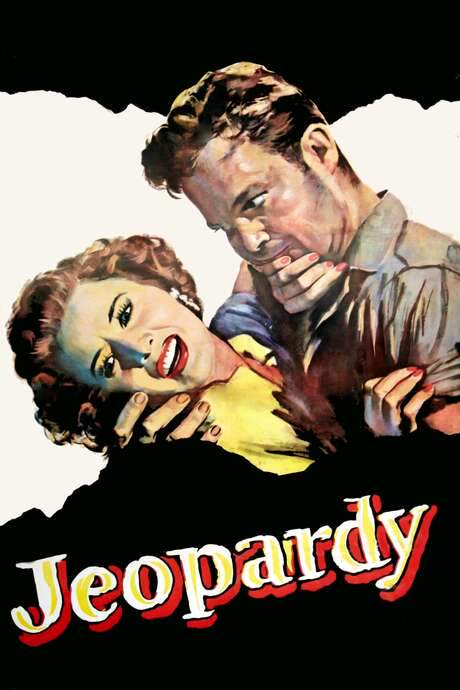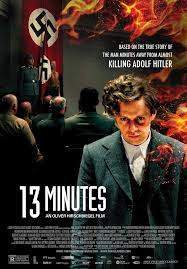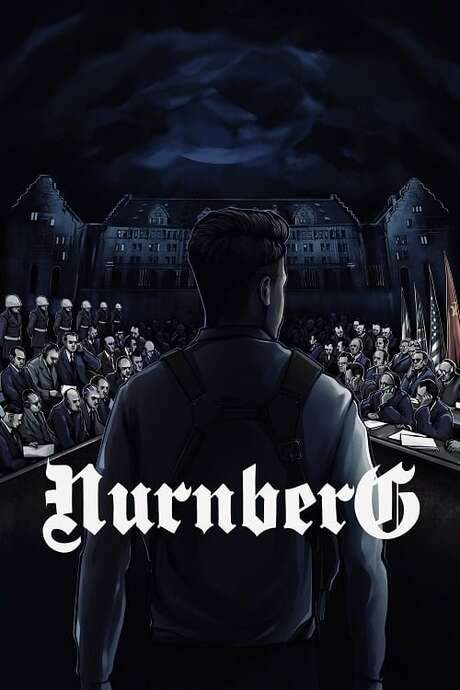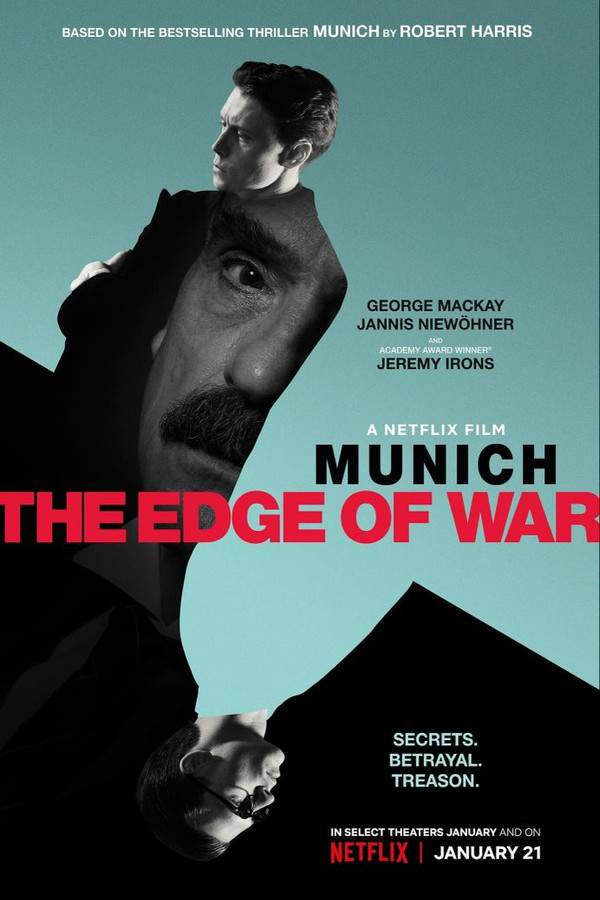
Munich: The Edge of War
In the autumn of 1938, with Europe on the brink, British civil servant Hugh Legat and German diplomat Paul von Hartmann are reunited in Munich for a pivotal conference. As old friends, they find themselves navigating a complex and dangerous political landscape, attempting to avert a looming war. Their personal connection is tested as they confront the escalating tensions and the potential for devastating consequences, struggling to reconcile their loyalties and the uncertain fate of the continent.
Warning: spoilers below!
Haven’t seen Munich: The Edge of War yet? This summary contains major spoilers. Bookmark the page, watch the movie, and come back for the full breakdown. If you're ready, scroll on and relive the story!
Munich: The Edge of War (2022) – Full Plot Summary & Ending Explained
Read the complete plot breakdown of Munich: The Edge of War (2022), including all key story events, major twists, and the ending explained in detail. Discover what really happened—and what it all means.
In 1932, three friends, Hugh Legat, Paul von Hartmann, and his girlfriend Lena (Liv Lisa Fries), gather to celebrate their graduation from Oxford University. Hartmann feels strongly about showcasing the changing landscape of Munich, inviting them to experience the “New Germany.”
Fast forward six years, and Legat is now the secretary to British Prime Minister Neville Chamberlain, amid the looming threat of war in Europe. He is married to Pamela Legat, while Chamberlain is on a desperate quest for peace with Adolf Hitler (Ulrich Matthes), willing to go to great lengths, including conceding the Sudetenland from Czechoslovakia, a nation allied with Britain. However, matters escalate when negotiations fail, as Hitler devises plans to invade the Sudetenland the very next day. Legat works under Sir Osmund Cleverly in the office of the Prime Minister’s Office.
Chamberlain recalls a statement from Hitler showcasing that he considers Mussolini as a confidant. With a fierce determination to avert war, Chamberlain reaches out to Benito Mussolini, pleading for intervention; his efforts momentarily yield results, as Mussolini’s interference prompts Hitler to agree to a Munich conference with Chamberlain and French Prime Minister Édouard Daladier.
Meanwhile, Hartmann operates as a translator in the Foreign Office of Berlin while plotting a coup alongside a Wehrmacht general, intending to arrest Hitler should the generals agree to the bold move. He is torn between his ambitions and doubts about the army’s resolve, knowing that permitting Hitler’s invasion could make a transition of power feasible.
As the conference approaches, Hartmann grows increasingly concerned that Chamberlain might be deceived into sacrificing Sudetenland to stave off war, thus rendering any conspiracy to arrest Hitler futile. He receives a crucial piece of intel from his lover Helen Winter, who provides a stolen document indicating Hitler’s plans to expand his dominion over Europe. Recognizing the urgency, Hartmann and his conspirators agree that they must deliver this information to Chamberlain in Munich before any agreements are finalized. Hartmann suggests his old friend, Legat, as someone who could assist, and soon Sir Horace Wilson and a senior MI6 official enlist Legat’s help to secure the document.
Legat’s memories of a passionate argument with Hartmann over his past support for Nazism linger in his thoughts as he embarks on this risky mission. He convinces Chamberlain to take him along to Munich under the guise of a translator. Once in Munich, Hartmann stealthily conceals the document and a pistol on Hitler’s train, only to encounter Franz Sauer, an SS officer and old acquaintance who grows suspicious of his actions.
Upon their reunion in Munich, Hartmann and Legat navigate their complex past while strategizing about how to present the document’s implications to Chamberlain. However, when they finally meet with the Prime Minister, Chamberlain dismisses their concerns, signing the Munich Agreement shortly after. Hartmann and Legat are left with a vow: Legat will ensure the document reaches London, continuing their fight against the impending war.
Later, Hartmann unveils a tragic tale about Lena—victim to the brutal regime, enduring unspeakable pain after attending an anti-Nazi rally. As tensions intensify, Hartmann’s determination leads him towards an assassination plot against Hitler. However, his brave intentions collide with the harsh realities of espionage and betrayal, especially when Legat’s hotel room is ransacked by Franz.
The political dynamic sharpens when Joan Menzies (Anjli Mohindra), a typist, unknowingly becomes a pivotal character, safeguarding the crucial document from being discovered by Sauer. As Chamberlain returns from Munich basking in the applause, he shares his infamous “Peace for our time” speech, and Legat decides to leave his post to join the RAF as the winds of war draw closer.
Ultimately, the Munich Agreement crumbles just a year later, leading to the outbreak of World War II. Chamberlain resigns in indignation, soon facing death, yet the intelligence extracted from that daring document provides the groundwork for Britain’s eventual triumph in the war.
Last Updated: November 15, 2024 at 18:25
Ending Explained – What Happens at the End of Munich: The Edge of War?
Still wondering what the ending of Munich: The Edge of War (2022) really means? Here’s a spoiler-heavy breakdown of the final scene, major twists, and the deeper themes that shape the film’s conclusion.
At the end of “Munich: The Edge of War,” the true consequences of the characters’ choices and the brutal reality of that historical moment become very clear. Paul Von Hartman, who initially believed in Hitler’s promises, undergoes a profound transformation after witnessing the horrors inflicted on Lena, his Jewish girlfriend, and after uncovering evidence proving Hitler’s true intentions. Despite his efforts to prevent the Munich treaty by revealing this information to the British government, he ultimately fails to stop it. The treaty, which was supposed to avert war by ceding the Sudetenland to Germany, only temporarily delays the inevitable. Within a year, Hitler breaks the agreement, invading Poland and igniting World War II.
The film shows how political appeasement, motivated by a desire to avoid conflict, can embolden tyrants rather than tame them. Neville Chamberlain’s strategy of diplomatic negotiation buys time but ultimately enables Hitler’s expansionist ambitions. Meanwhile, Hitler is portrayed as a manipulative leader who conceals his true motives behind propaganda, only to reveal his ruthlessness once he feels secure enough to act.
In the final scenes, Hitler’s discontent and the aftermath of the Munich agreement are palpable. He is furious that Chamberlain received credit for “peace,” while he saw it as a betrayal and a temporary victory for his plans of conquest. The film emphasizes that totalitarian regimes thrive on control of perceptions and that their real agendas remain hidden behind layers of deception.
A key message of the story is a reflection on human nature—how often people prefer to turn a blind eye to injustices until they are personally affected. Paul’s moral journey underscores that true resistance often comes too late and that moral courage is difficult to summon when one isn’t directly impacted by oppression. The ending leaves viewers contemplating the tragic cost of political complacency, the importance of foresight, and the dangers of appeasement in the face of evil. Ultimately, it’s a sobering reminder that history can repeat itself when human beings fail to recognize and challenge tyranny early enough. The film closes on the somber realization that the world narrowly escaped disaster, but only through the sacrifice of truth and moral conviction.
Last Updated: June 25, 2025 at 08:58
Explore Movie Threads
Discover curated groups of movies connected by mood, themes, and story style. Browse collections built around emotion, atmosphere, and narrative focus to easily find films that match what you feel like watching right now.
Historical Espionage Thrillers like Munich: The Edge of War
High-stakes spy missions conducted in the shadow of a ruthless totalitarian regime.Explore movies similar to Munich: The Edge of War that feature tense spy missions set against historical backdrops. If you liked the high-risk political maneuvering within Nazi Germany, you'll find these stories of clandestine operations, fraught alliances, and desperate measures under dictatorship compelling.
Narrative Summary
Narratives in this thread typically follow a lone operative or a small, isolated cell attempting to achieve a critical objective against a powerful, monolithic enemy. The plot is driven by close calls, betrayals, and the constant threat of exposure, often culminating in a finale where success is ambiguous or comes at a great personal cost.
Why These Movies?
These films are grouped by their shared setting of a repressive political system and the specific type of tension generated by espionage within it. They deliver a consistent vibe of anxiety, high risk, and grim determination, appealing to viewers who enjoy politically charged thrillers with heavy historical stakes.
Bitterswart Political Dramas like Munich: The Edge of War
Stories where a desperate fight against tragedy yields a painful, Pyrrhic victory.Discover movies like Munich: The Edge of War that explore desperate attempts to change the course of history. These films share a bittersweet tone, where characters' heroic efforts result in a complex mix of limited success and tragic consequence, perfect for viewers who appreciate heavy, morally ambiguous historical stories.
Narrative Summary
The narrative arc involves a clear, urgent mission to stop a catastrophic event. The protagonists invest everything, facing immense obstacles, but the resolution is not a clean victory. Instead, it's a compromise—a smaller win that fails to prevent the larger tragedy, leaving characters and viewers with a heavy sense of what was lost versus what was narrowly saved.
Why These Movies?
These films are united by their specific emotional payoff: a bittersweet ending following a high-tension, high-stakes plot. They balance the thrill of a political or historical thriller with the profound emotional weight of a drama, creating a memorable experience defined by its melancholic resolution.
Unlock the Full Story of Munich: The Edge of War
Don't stop at just watching — explore Munich: The Edge of War in full detail. From the complete plot summary and scene-by-scene timeline to character breakdowns, thematic analysis, and a deep dive into the ending — every page helps you truly understand what Munich: The Edge of War is all about. Plus, discover what's next after the movie.
Munich: The Edge of War Timeline
Track the full timeline of Munich: The Edge of War with every major event arranged chronologically. Perfect for decoding non-linear storytelling, flashbacks, or parallel narratives with a clear scene-by-scene breakdown.

Characters, Settings & Themes in Munich: The Edge of War
Discover the characters, locations, and core themes that shape Munich: The Edge of War. Get insights into symbolic elements, setting significance, and deeper narrative meaning — ideal for thematic analysis and movie breakdowns.

Munich: The Edge of War Ending Explained
What really happened at the end of Munich: The Edge of War? This detailed ending explained page breaks down final scenes, hidden clues, and alternate interpretations with expert analysis and viewer theories.

Munich: The Edge of War Spoiler-Free Summary
Get a quick, spoiler-free overview of Munich: The Edge of War that covers the main plot points and key details without revealing any major twists or spoilers. Perfect for those who want to know what to expect before diving in.

More About Munich: The Edge of War
Visit What's After the Movie to explore more about Munich: The Edge of War: box office results, cast and crew info, production details, post-credit scenes, and external links — all in one place for movie fans and researchers.

Similar Movies to Munich: The Edge of War
Discover movies like Munich: The Edge of War that share similar genres, themes, and storytelling elements. Whether you’re drawn to the atmosphere, character arcs, or plot structure, these curated recommendations will help you explore more films you’ll love.
Explore More About Movie Munich: The Edge of War
Munich: The Edge of War (2022) Scene-by-Scene Movie Timeline
Munich: The Edge of War (2022) Movie Characters, Themes & Settings
Munich: The Edge of War (2022) Ending Explained & Theories
Munich: The Edge of War (2022) Spoiler-Free Summary & Key Flow
Movies Like Munich: The Edge of War – Similar Titles You’ll Enjoy
Munich (2005) Ending Explained & Film Insights
13 Minutes (2017) Full Summary & Key Details
Close to the Enemy (1000) Full Movie Breakdown
Hitler: The Rise of Evil (1000) Story Summary & Characters
Countdown to War (1989) Full Summary & Key Details
Days of Betrayal (1973) Movie Recap & Themes
The Mortal Storm (1940) Full Summary & Key Details
Edge of Darkness (1943) Ending Explained & Film Insights
Appointment in Berlin (1943) Film Overview & Timeline
Nurnberg (2023) Spoiler-Packed Plot Recap
British Intelligence (1939) Full Movie Breakdown
The Man Between (1953) Plot Summary & Ending Explained
Hangmen Also Die! (1943) Complete Plot Breakdown
Night Train to Munich (1940) Story Summary & Characters
21 Hours at Munich (1976) Complete Plot Breakdown

